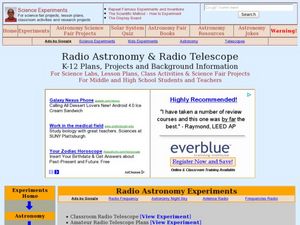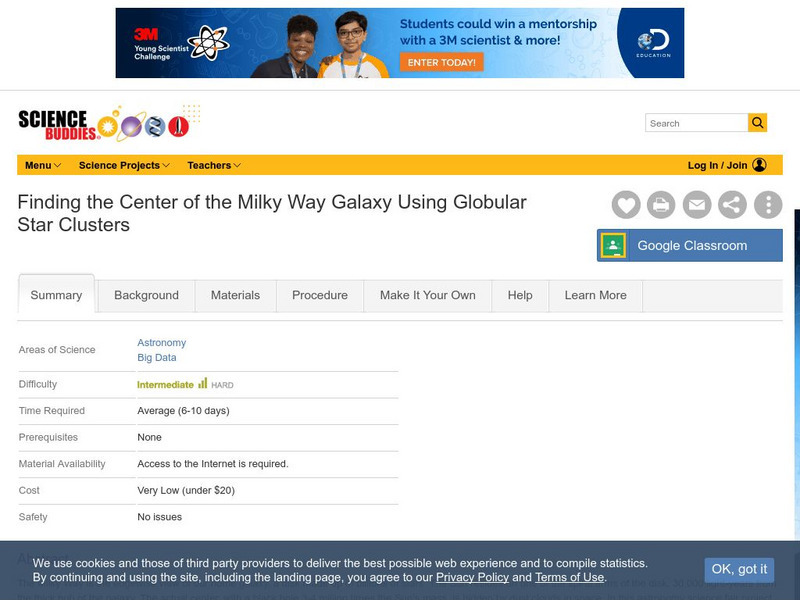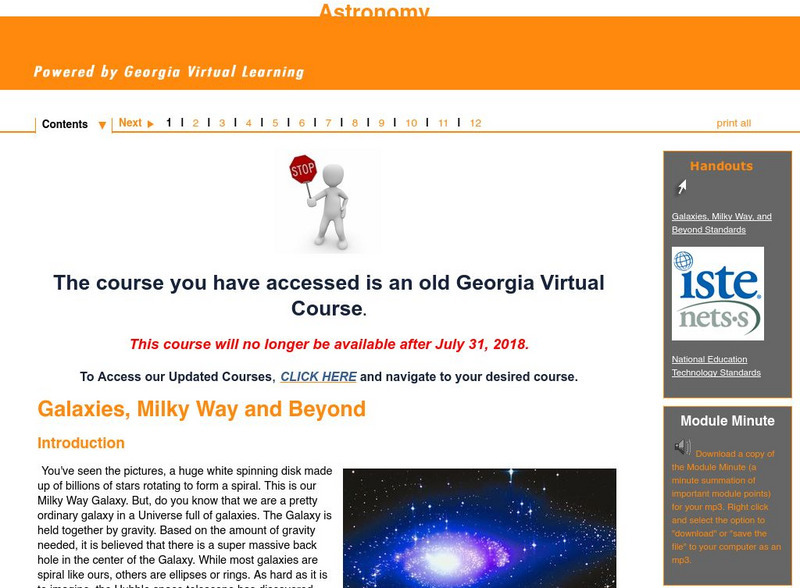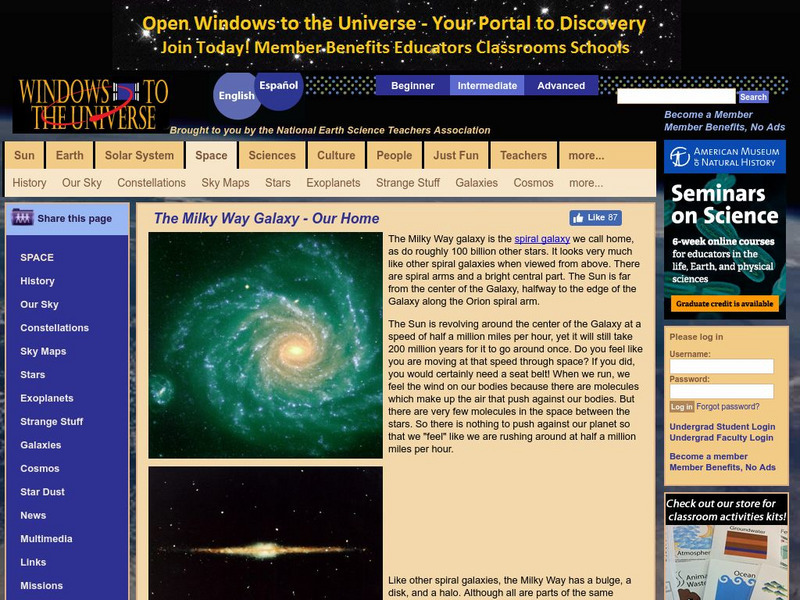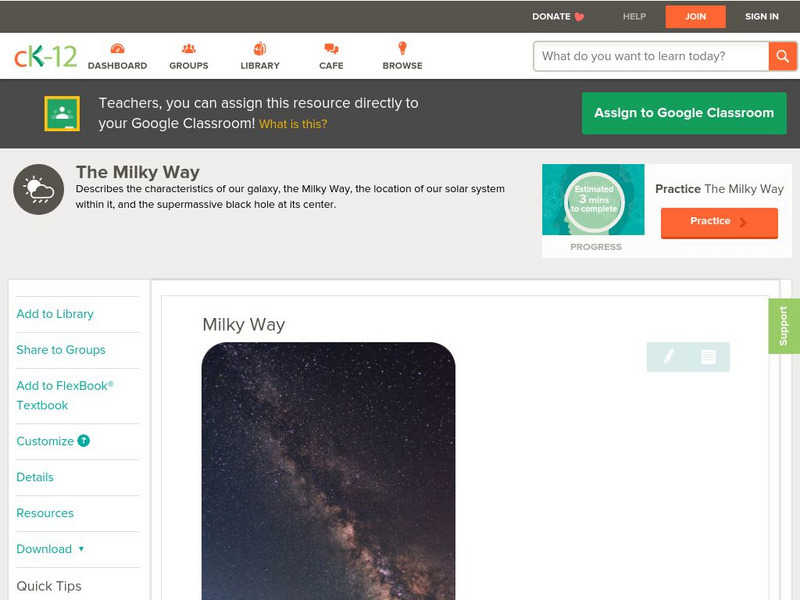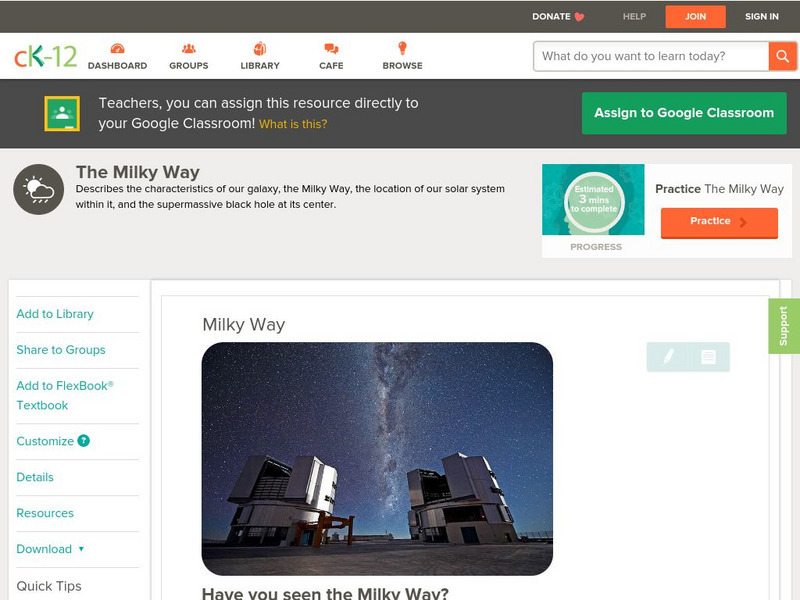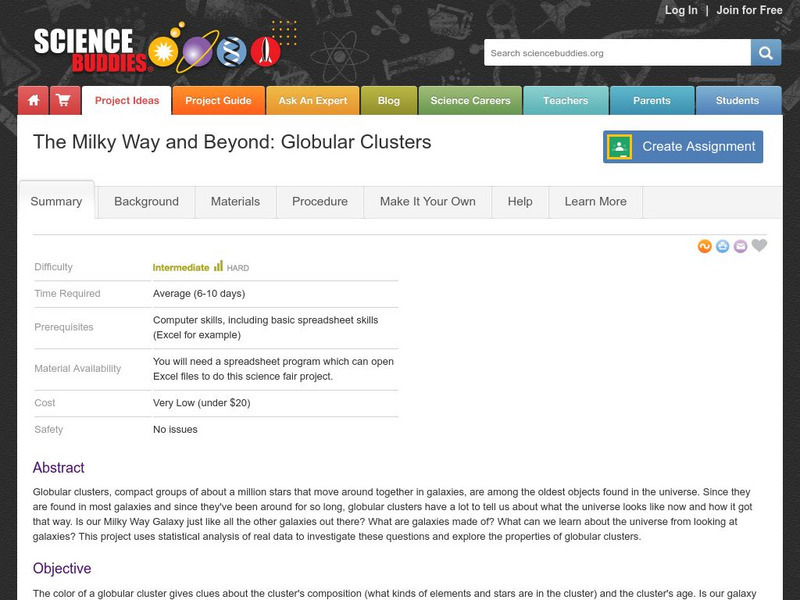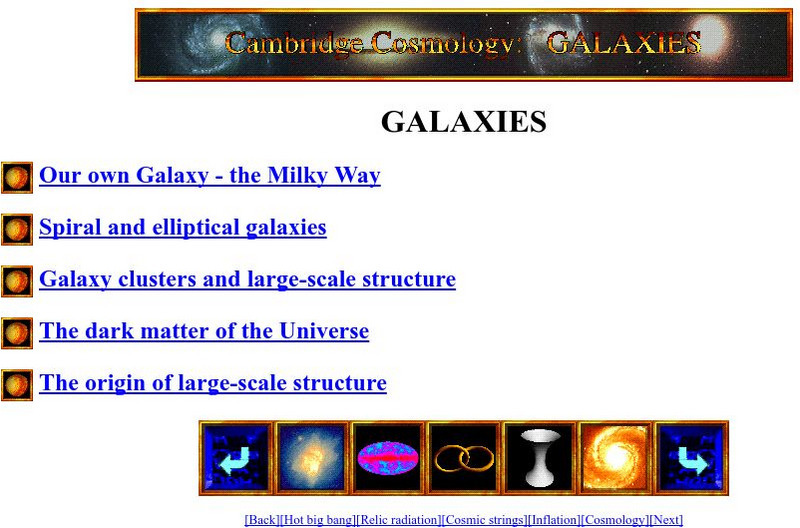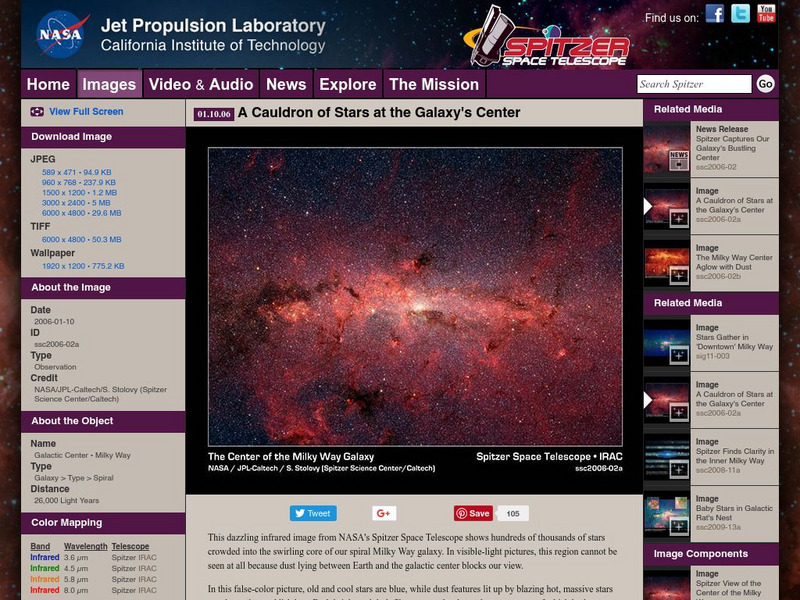Curated OER
Radio Astronomy and Radio Telescope
Students construct a simple radio telescope. In this astronomy lesson plan, students explain how this telescope works and what information it collects.
Curated OER
Expanding Children's Geographic and Economic Worlds
Students learn their addresses and gain a sense of connection between their neighborhood and the rest of the world and the universe.
Curated OER
Astronomy
Students complete a unit of lessons on our solar system, its stars, and astronomers. They record information in a space journal, design constellations, define key vocabulary, observe the phases of the moon, and create a group planet...
Curated OER
Star Wars Activity
Students investigate radiant energy by completing discrepant events and identify various temperature changes through absorption and how radiant energy can be used for solar panels. They experiment with different color fabrics in order...
Curated OER
Popcorn Science
Students identify and apply the scientific method through an experiment with popcorn. Then they identify what independent, dependent, and control variables are and create a list of different variables that affect popcorn popping....
Curated OER
Cosmology
In this space science worksheet, students find the words that are related to the study of cosmology and the answers are found at the bottom of the page.
Curated OER
General Knowledge Quiz
In this general knowledge worksheet, students attempt to answer 30 trivia questions on subjects ranging from art, geography, films, books and popular culture. The directions say to listen and answer. It is unclear how this is to be used;...
Curated OER
Solar System (Lesson 2)
Eighth graders identify the objects that make up the solar system. They define new vocabulary and practice using them. They discover that the sun is a star.
Curated OER
Sunshine and Shadows
Students measure their shadows early in the morning, record direction of shadow, make marks in ground with chalk or tape, measure with ruler, and record results. Students repeat process at noon, and then later in afternoon. Students...
Curated OER
The Vocabulary of Space
Students build their knowledge and understanding of vocabulary related to space. In this space lesson, students discuss four categories of words and phrases related to space.
Science Buddies
Science Buddies: Find Center of Milky Way Galaxy Using Globular Star Clusters
The Milky Way is the edgewise view of our home galaxy, a disk made up of billions of stars. The Sun resides on one of the spiral arms of the disk, 30,000 light-years from the thick hub of the galaxy. The actual center, with a black hole...
Georgia Department of Education
Ga Virtual Learning: Galaxies, the Milky Way and Beyond
In this interactive tutorial students will explore galaxies. Learn what the Milky Way Galaxy is like, how various galaxies are grouped into clusters and superclusters and why those particular galaxies clump together.
National Earth Science Teachers Association
Windows to the Universe the Milky Way Galaxy
Learn what Milky Way galaxy is made of and what it looks like, as well as how it relates to other known galaxies. Read "Questions and answers about the Milky Way" for further information.
CK-12 Foundation
Ck 12: Earth Science: Milky Way
[Free Registration/Login may be required to access all resource tools.] Identify the shape and size of the Milky Way and where our solar system is located in the Milky Way.
CK-12 Foundation
Ck 12: Earth Science: Milky Way
[Free Registration/Login may be required to access all resource tools.] Identify the shape and size of the Milky Way and where our solar system is located in the Milky Way.
American Museum of Natural History
American Museum of Natural History: Ology: Milky Way Galaxy
How big is a billion? Find out some interesting facts about our galaxy, the Milky Way, and its billion stars.
Science Buddies
Science Buddies: The Milky Way and Beyond: Globular Clusters
Globular clusters, compact groups of about a million stars that move around together in galaxies, are among the oldest objects found in the universe. Since they are found most galaxies and since they've been around for so long, globular...
NASA
Nasa: Milky Way
This Milky Way image is part of a series of photographs taken from the Spitzer Space Telescope. The picture is accompanied by a textual overview of the Milky Way with specific attention given to the details of the picture. Several higher...
Other
University of Cambridge Cosmology: Galaxies
This site from the University of Cambridge allows you to view information on spiral, elliptical, and Milky Way galaxies, as well as galaxy clusters. Provides basic facts about each one.
Mr. Nussbaum
Mr. Nussbaum: Galaxies Reading Comprehension
This learning module includes a nonfiction reading passage about galaxies including the Milky Way followed by a multiple choice self-assessment which gives students immediate feedback.
Cosmos 4 kids
Cosmos4 Kids: Galaxies: Milky Way
Learn the basic facts about the Milky Way. Brief, to the point text make this site most suitable for younger students.
University of Texas at Austin
The University of Texas Mc Donald Observatory: The Milky Way
Students will work in groups to make up a story and picture that explains how someone living thousands of years ago in their location might have explained the Milky Way.
California Institute of Technology
Spitzer Science Center: Center of the Milky Way
This space telescope image displays the center of the Milky Way Galaxy and its "A Cauldron of Stars." In addition, a detailed textual overview explains various specifics of the picture.
Australian Broadcasting Corporation
Australian Broadcasting Corporation: News in Science: Milky Way Has an Extra Sweeping Arm
From ABC News in Science, this article discusses the shape of the Milky Way Galaxy and the presence of an additional arm attached to the galaxy.
Other popular searches
- Milky Way Galaxy Map
- The Milky Way Galaxy
- Milky Way Galaxyt
- Milky Way Galaxy Lab
- Milky Way Galaxy Diagram


